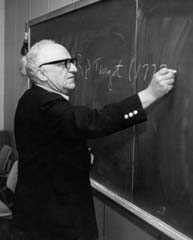Man is born naked into the world, and needing to use his mind to learn how to take the resources given him by nature, and to transform them (for example, by investment in "capital") into shapes and forms and places where the resources can be used for the satisfaction of his wants and the advancement of his standard of living. The only way by which man can do this is by the use of his mind and energy to transform resources ("production") and to exchange these products for products created by others. Man has found that, through the process of voluntary, mutual exchange, the productivity and hence, the living standards of all participants in exchange may increase enormously. The only "natural" course for man to survive and to attain wealth, therefore, is by using his mind and energy to engage in the production-and-exchange process. He does this, first, by finding natural resources, and then by transforming them (by "mixing his labor" with them, as Locke puts it), to make them his individual property, and then by exchanging this property for the similarly obtained property of others. The social path dictated by the requirements of man's nature, therefore, is the path of "property rights" and the "free market" of gift or exchange of such rights. - Murray N. Rothbard, The Anatomy of the State
 Following la Boétie, Rothbard knew that, after the initial force establishing rule, states rely on the support of the majority of its subjects. He pointed out that this support "need not be active enthusiasm; it may well be passive resignation." This support was secured by vested economic interests. This included not only government functionaries, but in favored economic entities, such as the military industrial complex and various favored interests and corporations. The mystique of legitimacy was also maintained by ideology. While in the distant past this ideological indoctrinization had been done by a cozy alliance of church and state, Rothbard saw that in modern times that function was served by "intellectual" opinion molders, doing what Noam Chomsky famously called "Manufacturing Consent."
Following la Boétie, Rothbard knew that, after the initial force establishing rule, states rely on the support of the majority of its subjects. He pointed out that this support "need not be active enthusiasm; it may well be passive resignation." This support was secured by vested economic interests. This included not only government functionaries, but in favored economic entities, such as the military industrial complex and various favored interests and corporations. The mystique of legitimacy was also maintained by ideology. While in the distant past this ideological indoctrinization had been done by a cozy alliance of church and state, Rothbard saw that in modern times that function was served by "intellectual" opinion molders, doing what Noam Chomsky famously called "Manufacturing Consent."
|
 Following la Boétie, Rothbard knew that, after the initial force establishing rule, states rely on the support of the majority of its subjects. He pointed out that this support "need not be active enthusiasm; it may well be passive resignation." This support was secured by vested economic interests. This included not only government functionaries, but in favored economic entities, such as the military industrial complex and various favored interests and corporations. The mystique of legitimacy was also maintained by ideology. While in the distant past this ideological indoctrinization had been done by a cozy alliance of church and state, Rothbard saw that in modern times that function was served by "intellectual" opinion molders, doing what Noam Chomsky famously called "Manufacturing Consent."
Following la Boétie, Rothbard knew that, after the initial force establishing rule, states rely on the support of the majority of its subjects. He pointed out that this support "need not be active enthusiasm; it may well be passive resignation." This support was secured by vested economic interests. This included not only government functionaries, but in favored economic entities, such as the military industrial complex and various favored interests and corporations. The mystique of legitimacy was also maintained by ideology. While in the distant past this ideological indoctrinization had been done by a cozy alliance of church and state, Rothbard saw that in modern times that function was served by "intellectual" opinion molders, doing what Noam Chomsky famously called "Manufacturing Consent."